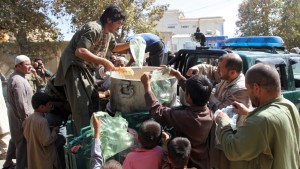Brand new Afghan refugee exodus
Thousands of Afghans are fleeing their country as the civil war there gathers steam creating a new exodus of refugees seeking safety.
Iran and Pakistan, which house most of the Afghan refugees from previous cycles of violence, have become increasingly unwelcoming in recent months, forcing these most recent of the region’s displaced to flow toward Europe.
These Afghans have attracted little attention from Western policy makers who have been preoccupied with the Syrian conflict.
Western nations have been slow to recognise these Afghans’ desperation, and the challenges their flight poses for Afghanistan, its neighbors and Europe.
For Afghans, the violence is a recurring nightmare. Like previous exoduses going back to the 1970s, this one is stripping the country of precisely the professionals who are vital to its future as a modern state.
The new exodus of refugees began with the Taliban’s offensive this year, and intensified after fighting reached populated areas like Kunduz.
Last month, employees at Afghanistan’s passport agency said they were issuing an average of 2,000 passports daily – triple the number of six months ago.
In recent decades, most Afghan refugees have moved to Pakistan, which now hosts nearly three million.
But refugees there say that increasingly local officials have been forcing them to return home.
The International Organization for Migration says 90,000 Pakistan-based Afghans have returned home since January.
To exacerbate matters the Pakistan Government is now refusing to give identity cards to 1.5 million refugees, many of whom have been in Pakistan for decades, when their permits expire at year’s end.
Iran, too, has been deporting refugees. One reason is fear that Afghans with ties to the drug trade will compound Iran’s own drug-use problems.
Deportation can be a harsh sentence. Some returnees end up in United Nations camps near Jalalabad, a stronghold for former Taliban militants who joined the Islamic State.
The danger is worst for ethnic Hazaras – Shiite Muslims many of whom fled slaughter by the Taliban.
Afghans cannot expect much help from their own government. One official American report says the State Department stopped funding a training program for Afghanistan’s refugee and repatriation ministry last year after finding the ministry corrupt and dysfunctional.
Helping Afghan refugees is not an easy issue for Pakistani officials, who already deal with a million internally displaced Pakistanis fleeing conflict in their own border areas.
Consequently, displaced Afghans are increasingly looking to Europe as a destination, despite a perilous trek across Iran, Turkey and the Mediterranean.
According to United Nations and European estimates, more than 20 percent of the roughly 500,000 people who have arrived this year via the Mediterranean have been Afghans.
Sarah Gilmour
AMES Australia Staff Writer













